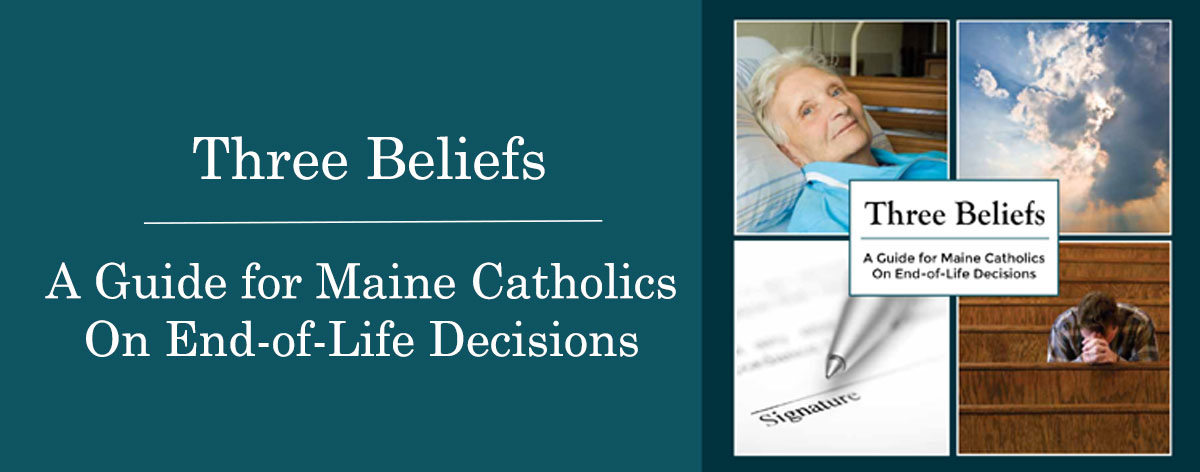Three Beliefs

Three Beliefs is a guide for Maine Catholics that offers valuable assistance and information regarding end-of-life issues.
The 20-page document, produced by the Diocese of Portland, includes:
- an explanation of Catholic teaching on life-sustaining treatment and care;
- an introductory letter from Bishop Robert P. Deeley;
- the Maine Advance Directive form modified to ensure consistency with both Catholic teaching and Maine law;
- and a helpful FAQ section.
For a printer-friendly version of Three Beliefs, click here. To view a color version of Three Beliefs, click here.
Additional resources and information on a variety of topics regarding Catholic teaching on the end of life can be found below.
Copies of Three Beliefs are also available by contacting your local parish. You may also request a copy by contacting the Diocese of Portland at (207) 773-6471.
Organ Donation
Over the years, the waiting list for organs has consistently exceeded the number of organs donated. Organs for transplantation come from both living and deceased donors.
Catholic teaching holds that organ donation is a generous and noble act as long as adequate moral criteria are met, including free and informed consent and the preservation of bodily integrity in the case of a living donor.
Pope Saint John Paul II described organ donation as a particularly praiseworthy example of everyday heroism if “performed in an ethically acceptable manner, with a view to offering a chance of health and even of life itself to the sick who sometimes have no other hope.”
Particularly important for donation after death is that the donor is properly declared dead, either by cardiopulmonary or neurological criteria. In order for the determination of death by neurological criteria to be morally acceptable, there must be rigorous testing that confirms the entire brain has irreversibly ceased to function.
Further information:
- The Gospel of Life (n. 86)
- Catechism of the Catholic Church (n. 2296)
- Pope Saint John Paul II on Organ Donation and Transplantation
Palliative Care
The challenges of serious and terminal illnesses can be overwhelming. Palliative care offers compassion, understanding, and expertise to treat the physical, spiritual, and emotional symptoms patients may experience so they may live life to the fullest extent possible.
Palliative care typically combines medical skill with attention to the emotional and spiritual needs of patients.
Pope Benedict XVI spoke of the Church’s support for the seriously ill and encouraged the promotion of policies to create conditions where individuals may bear illness and the end of life in a dignified manner. The Holy Father said, “it is necessary to stress once again the need for more palliative care centres which provide integral care, offering the sick the human assistance and spiritual accompaniment they need. This is a right belonging to every human being, one which we all must be committed to defend.”
Further information:
- “Killing the Pain not the Patient: Palliative Care vs Assisted Suicide,” by Richard M. Doerflinger and Carlos F. Gomez, M.D., Ph.D.
Life-Sustaining Treatment and Care
Life-sustaining treatment and care may be generally defined as any medical or surgical intervention or basic form of care without which a person cannot live. Stewardship of the gift of life includes the universal moral obligation to conserve human life in a way that corresponds appropriately to the condition of a person’s life: our own or anyone for whom we have responsibility. This means that life-sustaining treatment and care that has a reasonable hope of benefit, and does not cause an excessive burden, is morally obligatory. Any life-sustaining treatment or care that does not have a reasonable hope of benefit or is excessively burdensome is morally optional. This principle from the Catholic moral tradition helps us to understand that the extremes of euthanasia or physician-assisted suicide on the one hand, and over-zealous interventions on the other, are to be avoided. Far from being a humane and gentle way to end life, euthanasia can only distance us from our faith, as it assumes that at some point human life ceases to possess meaning. Only by seeing the value in every form of human life, even in those who are suffering, can we seek to understand God’s purpose for us.
In his encyclical entitled Evangelium Vitae, Pope Saint John Paul II wrote, “when he denies or neglects his fundamental relationship to God, man thinks he is his own rule and measure, with the right to demand that society should guarantee him the ways and means of deciding what to do with his life in full and complete autonomy.” He went on to quote the Second Vatican Council stating, "It is in the face of death that the riddle of human existence becomes most acute" and yet "man rightly follows the intuition of his heart when he abhors and repudiates the absolute ruin and total disappearance of his own person. Man rebels against death because he bears in himself an eternal seed which cannot be reduced to mere matter."
The moral teaching and tradition of the Catholic Church provides valuable guidance on the principles that should inform conscience about these decisions.
Advance health care directives can be very important for expressing one’s well-formed conscience on the issue of life-sustaining treatment and care.
Additional Resources
- Evangelium Vitae (The Gospel of Life) (ns. 63–67)
- Catechism of the Catholic Church (ns. 2276–2279)
- Ethical and Religious Directives for Catholic Health Services
- Vatican Declaration on Euthanasia
- Vatican Statement on Medically-Administered Nutrition and Hydration
- Saint John Paul II on the Patient in the Persistent Vegetative State
- Resources from the U.S. Bishops on End-of-Life Care









